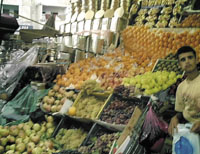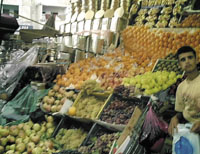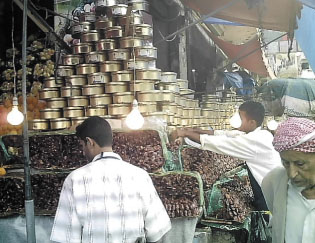
Ramadan shopping as a religious & cultural reflection [Archives:2007/1086/Reportage]
September 17 2007
 |
 |
For Yemen Times
During Ramadan, shopping becomes a mundane activity because of the requirements that the Holy Month places on families for cooking meals. Shopping, however, is more than just buying food; it's a reflection that characterizes the Yemeni family in particular.
Ramadan shopping usually starts after the noon prayer. At that time, shops start opening and sellers start showing their products. “I open my shop at 1:00 Pm, after the noon prayer”, said Gehad, a fish seller. People come from home, and some from the mosque. “We do not shop before the noon prayer because most of the shops are closed”, said Esam Aklan.
For those who have work, they come later, about 2:00 to 3:00 pm. “The most suitable time for shopping is when I leave my work since I can not do so before”, said Riadh Salam, a bank employee.
Shopping can be divided into parts according to the materials that people need in relation with the time left and time needed for cooking.
Furthermore, it is noticed that there is a kind of priority in buying materials. That is to say, in the other months, it may not be a big deal what they buy first or last. However, high demand places a competitive sprit within families to get what they need. For example: They usually start buying heavy items which are required for dinner, such as meat, chicken or fish. Zakiah, a housewife, said “I always emphasize on having meat so that I can cook early.” In order to kill two birds with one stone, some people get their children to take such items home so that fathers save time and do more shopping. “I take one of my children especially when I want to buy meat”, stated Tawfeek Al-zaghrory.
Vegetables are also bought early, and preferred to be sent home to get an early start, along with the meat or fish. “Vegetables are necessary for cooking many dishes, and must be available when we get started”, Reham said.
After buying vegetables, consumers)especially those who make samosa at home)buy pastry, a mixture of flour, fat, and milk, or water. “Though samosa can be available ready-made in the markets, I prefer it home-made. However, I have to buy the pastry and other materials early”, said Adel Saed. Somasa.
Having prayed, people start another shopping tour in which they target other items, such as highly demanded fruits. Some fruits are bought in bulk to be used for juices, like oranges, mangos, and guavas. Furthermore, watermelons, apples, bananas, and grapes are some of the other fruits that are consumed throughout the night.
Moreover, sweets are also essential in almost every home during this month. In fact, more people buy sweets during Ramadan than any other month. Some make sweets at home, while many buy them ready-made from the markets. “I buy sweets from the markets because it is difficult to make so many different kinds at home”, said Hany Ma'amary.
Though dates are the most important item for breakfast, people buy it last. This is because it needs absolutely nothing as far as cooking is concerned. “When I finish buying all needed materials, I buy dates”, said Yasser Areki. In fact, most families keep dates in large qualities, thus there is no need to buy them daily.
The shopping timeframe and items in Ramadan reflect a social and religious culture in Yemen as an Islamic country. “Shopping has a different appeal in Yemen, distinguishing its social and religious customs from all other Islamic nations”, said Farid Algawaweeda, a Jordanian citizen living in Yemen.
——
[archive-e:1086-v:15-y:2007-d:2007-09-17-p:report]


